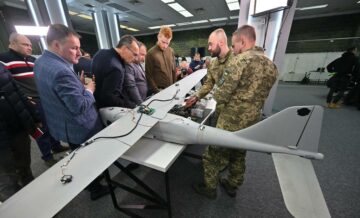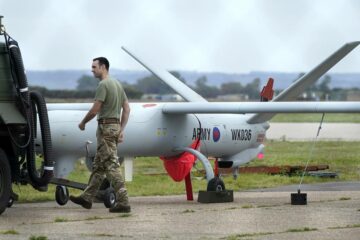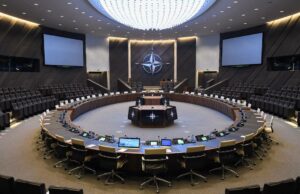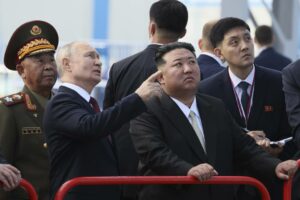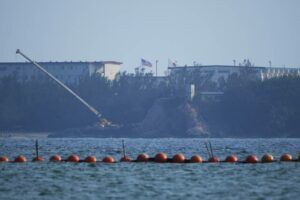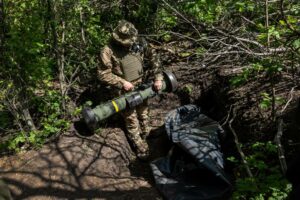
DUBAI, United Arab Emirates — Chinese defense contractors used the Dubai Airshow, which ran from Nov. 13-17, as a springboard for increased regional military cooperation with Beijing, a trend that U.S. leaders see as worrying.
While Chinese companies typically have a strong showing at defense expos held outside of NATO countries, they upped the ante this year in the field of unmanned aircraft, headlining their collection with a large mockup of a large, white helicopter drone. The platform, the AR-2000, is made by China’s National Aero-Technology Import & Export Corp., showcased for the first time internationally.
Officials here at the company’s sprawling stand kept its capabilities a mystery, saying only that the platform, available in three configurations, had completed its maiden flight earlier this year. The version on display appeared to be developed for ship-based operations, featuring short, folding wings and a large surveillance radar pod mounted under the nose.
A version armed with short-range guided missiles was briefly available for review to VIP guests two days before the event opened to the public and the news media, observers here noted.
A CATIC representative said that the AR-2000 is still undergoing testing but that it is already on order by China’s Ministry of National Defense.
More than 30 Chinese commercial and defense manufacturers presented their products here, with a wide-range of offerings geared towards regional government types window shopping for their militaries.
China has eyed ties to the Middle East for some time, initially more for economic opportunities but now also as a promising military market.
In October, Lt. Gen. Alexus Grynkewich, 9th Air Force commanders at U.S. Central Command’s Air Forces branch, warned about China’s possible long-term plans in the region, calling it a “fertile ground” for strategic cooperation with the Asian country.
“What I think is a reasonable assertion, though, is that where economic interests start, military interests will follow to protect those economic interests,” Grynkewich said at a press conference. “Over time,... there is a risk of Chinese expansion in the region militarily.”
Among the largest defense deals announced at the Dubai Airshow was a contract awarded by the Tawazun Council, the host country’s national defense acquisition organization, to CATIC, valued at $440 million, for an initial fleet of 12 L-15 advanced jet trainers.
Chinese executives eager to sell here also found UAE officials looking to nurse their own defense industry. Out of the 54 deals inked last week by the Tawazun Council, 31 were domestic contracts and 23 were international, of a total value of approximately $6.26 billion.
Domestic deals finalized here included a $1.1 billion contract to Lahab Defense Systems, part of EDGE Group, for the procurement of munitions, and an agreement with local company Black Diamond for the purchase of an unspecified air defense system, valued at $898.5 million.
Additionally, several contracts were signed with Global Aerospace Logistics for maintenance services and spare aircraft parts for the country’s joint air command, totaling $926 million.
A contract that could be worth nearly $1 billion is expected to be signed in the near future between the UAE’s Air Force and the Abu-Dhabi based firm Calidus Aerospace for the possible purchase of 40 B250 trainer aircraft.
Negotiations are ongoing, but the two parties signed a letter of intent at the airshow.
Awad Mustafa in Dubai contributed to this report.
Elisabeth Gosselin-Malo is a Europe correspondent for Defense News. She covers a wide range of topics related to military procurement and international security, and specializes in reporting on the aviation sector. She is based in Milan, Italy.
- SEO Powered Content & PR Distribution. Get Amplified Today.
- PlatoData.Network Vertical Generative Ai. Empower Yourself. Access Here.
- PlatoAiStream. Web3 Intelligence. Knowledge Amplified. Access Here.
- PlatoESG. Carbon, CleanTech, Energy, Environment, Solar, Waste Management. Access Here.
- PlatoHealth. Biotech and Clinical Trials Intelligence. Access Here.
- Source: https://www.defensenews.com/global/mideast-africa/2023/11/20/china-taps-mideast-airshow-to-prime-regional-defense-cooperation/
- :has
- :is
- :where
- $1 billion
- 1
- 10
- 12
- 23
- 26
- 30
- 31
- 40
- 54
- 70
- 9th
- a
- About
- acquisition
- advanced
- Aerospace
- Agreement
- AIR
- Air Force
- aircraft
- already
- also
- an
- and
- announced
- appeared
- approximately
- Arab
- Arab Emirates
- ARE
- armed
- AS
- asian
- At
- available
- aviation
- awarded
- based
- BE
- before
- Beijing
- between
- Billion
- Black
- Branch
- briefly
- but
- by
- calling
- capabilities
- central
- China
- Chinas
- chinese
- collection
- commercial
- Companies
- company
- Company’s
- Completed
- Conference
- contract
- contractors
- contracts
- contributed
- cooperation
- Corp
- could
- Council
- countries
- country
- country’s
- covers
- Days
- Deals
- Defense
- developed
- Diamond
- Display
- Domestic
- drone
- Dubai
- eager
- Earlier
- East
- Economic
- Edge
- emirates
- Ether (ETH)
- Europe
- Event
- executives
- expansion
- expected
- export
- expos
- Featuring
- field
- finalized
- Firm
- First
- first time
- FLEET
- flight
- follow
- For
- Force
- Forces
- found
- from
- future
- geared
- Gen
- Global
- Government
- Group
- guests
- guided
- had
- Have
- headlining
- Held
- helicopter
- here
- host
- HTTPS
- i
- images
- import
- in
- included
- increased
- industry
- initial
- initially
- inked
- intent
- interests
- International
- internationally
- IT
- Italy
- ITS
- joint
- jpg
- kept
- large
- largest
- Last
- leaders
- letter
- local
- logistics
- long-term
- looking
- made
- maintenance
- Manufacturers
- Market
- Media
- Middle
- Middle East
- MILAN
- militaries
- Military
- million
- ministry
- missiles
- more
- Mystery
- National
- Near
- nearly
- news
- news media
- nose
- noted
- nov
- now
- observers
- october
- of
- Offerings
- officials
- on
- ongoing
- only
- opened
- Operations
- opportunities
- order
- organization
- out
- outside
- own
- part
- parties
- parts
- plans
- platform
- plato
- Plato Data Intelligence
- PlatoData
- possible
- presented
- press
- Prime
- procurement
- Products
- promising
- protect
- public
- purchase
- radar
- range
- reasonable
- region
- regional
- related
- report
- Reporting
- representative
- review
- Risk
- s
- Said
- saying
- sector
- security
- see
- sell
- Services
- several
- she
- Shopping
- Short
- showcased
- showing
- signed
- some
- specializes
- stand
- start
- Still
- Strategic
- strong
- surveillance
- system
- Systems
- Taps
- Testing
- than
- that
- The
- their
- There.
- they
- think
- this
- this year
- those
- though?
- three
- Ties
- time
- to
- Topics
- Total
- towards
- Trend
- two
- types
- typically
- u.s.
- UAE
- under
- undergoing
- United
- United Arab Emirates
- used
- value
- valued
- version
- VIP
- was
- week
- were
- which
- white
- wide
- Wide range
- will
- window
- with
- worrying
- worth
- year
- zephyrnet

